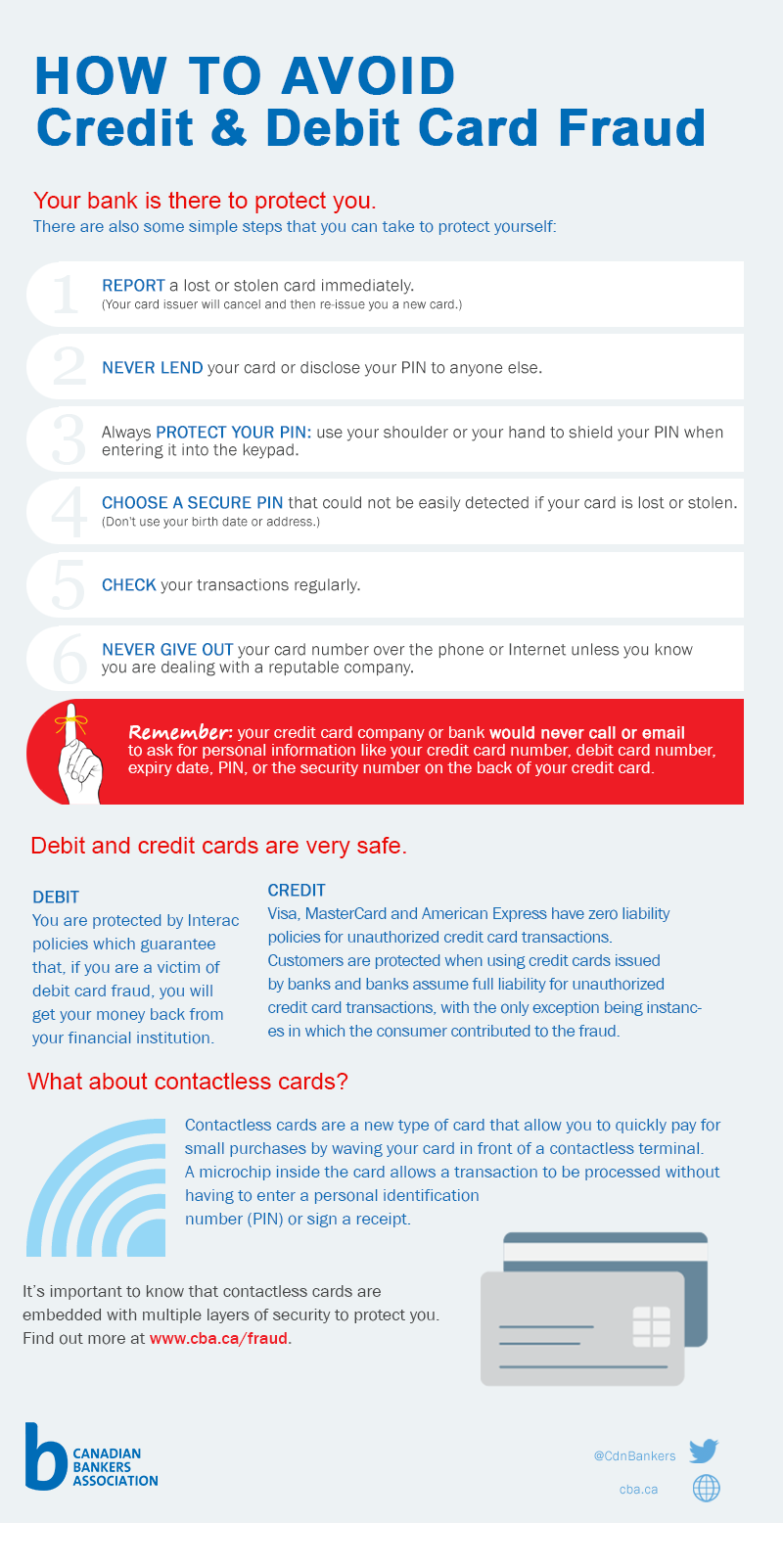Article
Credit cards are a convenient, safe and flexible method of payment accepted in more than 200 countries worldwide. While credit card fraud can happen, banks take significant steps to protect customers and minimize the fraud as much as possible.
What is credit card fraud?
Credit card fraud can happen several ways. Your card could be lost or stolen and used to purchase goods and services. A criminal could obtain your card number and expiry date and use this information to buy merchandise by phone or over the Internet. Or criminals could tamper with payment terminals at retailers to obtain your card information and create a counterfeit credit card.
Your bank is there to protect you
 Banks and the credit card companies take credit card fraud very seriously, and have highly sophisticated security systems and teams of fraud experts in place to monitor transactions, protect customers and prevent and detect credit card fraud. For example, the banks’ systems can automatically detect unusual activity in a customer’s account and take steps to prevent fraud from occurring.
Banks and the credit card companies take credit card fraud very seriously, and have highly sophisticated security systems and teams of fraud experts in place to monitor transactions, protect customers and prevent and detect credit card fraud. For example, the banks’ systems can automatically detect unusual activity in a customer’s account and take steps to prevent fraud from occurring.
Visa, MasterCard and American Express have zero liability policies for unauthorized transactions. Customers are protected when using credit cards issued by banks and are not responsible for fraudulent transactions made on their cards.
Canada has moved to chip-based technology
Banks and the major credit card companies have moved to chip technology for debit and credit cards. In addition to the magnetic stripe on the back, cards have a microchip – really a small computer – in the card.
Canadians have become accustomed to inserting their card into the store payment terminal and punching in their personal identification number (PIN) when making purchases, rather than signing a receipt. Chip cards use a technology called “cryptography” that allows the card and the store terminal to communicate with each other during the transaction and carry out security checks to ensure the card is valid.
The microchip is state-of-the-art in payment card technology and is extremely difficult for criminals to duplicate. In fact, chips cards have reduced counterfeiting fraud in Canada by 76% since they were introduced here in 2008.
To learn more about chip technology, visit Visa Canada and MasterCard Canada websites:
Use of contactless payment cards is growing
Banks are always looking at new technologies and security features to protect customers, and the credit card in your wallet may be sporting some new features.
The use of contactless credit cards – offered by Visa PayWave™ and MasterCard Tap & Go™ – is growing. These cards allow you to quickly pay for purchases under $100 by waving your card in front of a contactless terminal. A small radio frequency antenna and microchip inside the card allows a transaction to be processed without having to enter a personal identification number (PIN) or sign a receipt.
Contactless card transactions are processed through the same secure networks used for all other Visa and MasterCard transactions. Your card never leaves your hand and each transaction has a unique, encrypted code and changes every time the card is used.
How you can protect yourself
The banking industry works hard to prevent and detect credit card fraud using advanced technology and by assisting with police investigations. There are some simple steps that you can take to protect yourself as well:
- Report a lost or stolen card as soon as you notice it is gone. Your card issuer will cancel your card and issue you a new one
- If you have a chip card, insert first. If the store terminal isn’t chip capable it will prompt you to swipe. This will protect you from having your card skimmed. And always remember to take your card when the transaction is done
- Never lend your card or disclosing your PIN to anyone else
- Choose a PIN that could not be easily detected if your card is lost or stolen - don't use your birth date or address
- Make it a habit to regularly check your transactions online or on your monthly statement. If there are any charges that you didn’t make, report them to your card issuer right away
- Never give out your card number over the phone or Internet unless you know you are dealing with a reputable company
- Protect your Personal Identification Number (PIN): don't share it with anyone or write it down, memorize it
- Sometimes scammers will try to trick people into revealing information about their credit cards either over the phone or through e-mail. It’s important to know that your credit card company or bank would never call to ask for personal information like your credit card number, expiry number, PIN, or the security number on the back of your card
- Protect your credit card like you protect your cash. Never leave them unattended in your car or at work
- Always check your card when it is returned to you after a purchase. Make sure it is your card
- When travelling, carry your cards with you or make sure they are in a secure location such as a hotel safe
- Make a list of all your cards and their numbers and keep this in a secure place. This key information is helpful when reporting lost or stolen cards
What to do if you are a victim of credit card fraud
If you have charges on your credit card that you didn’t make or if you think that you may have revealed your credit card number when you shouldn’t have, contact your credit card issuer right away using the phone number on the back of your card. The card issuer will take the appropriate steps to protect you from fraud.
Did you know?
 The CBA offers a free fraud prevention seminar for seniors as part of its Your Money Seniors financial literacy seminar program.
The CBA offers a free fraud prevention seminar for seniors as part of its Your Money Seniors financial literacy seminar program.
Find out more and request a seminar for your seniors’ group at cba.ca/seniors.